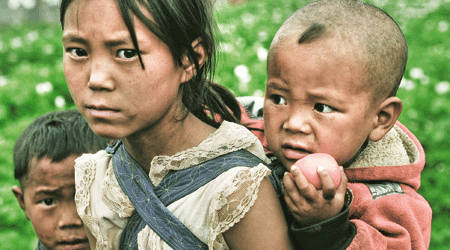School's out forever
The new semester begins today but Geloema, 12, won't be going back to school. Instead she stands on the hillside watching sheep. Most of the land here was deforested during the last 50 years. She can only watch as her former classmates flock down the path to the Yiguojue village school.
 |
|
Geloema (center) is 12. |
Geloema and her family of seven are among 178,642 people living over 3,000 meters above sea level in remote Meigu county, a part of the Liangshan Yi autonomous prefecture, Sichuan Province. Located in northeast Liangshan, this county is 98 percent Yi ethnic minority. An average farmer here earned 917 yuan a year in 2002.
Geloema's disabled mother and sick grandfather must stay at home while her father works all day cultivating a few parcels of near-barren soil for potatoes, corn and buckwheat to feed the family. He also works occasional odd jobs.
He took Geloema, the eldest, out of school at grade three. Geloema every week shepherds cattle and sheep belonging to her whole village. She chops wood, fetches water, cooks and takes care of her younger siblings, frail mother and grandfather.
Geloema is by no means alone in dropping out of school in the remote areas of mountainous Meigu county. Grade three to six students drop out fast, especially girls. More than 60 percent of rural children have dropped out of school to work at home despite a recent raft of national policies introducing free tuition and free textbooks to such areas.
For the moment, new policies cannot overcome age-old poverty and traditional thinking.
 0
0 






